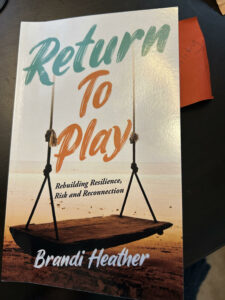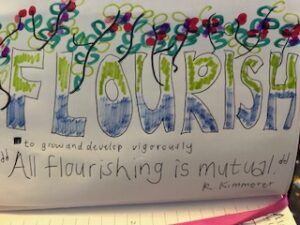Aware of faculty fatigue and the shifting and challenging post-secondary environment around us, I am looking for ways to bring energy and joy to my work. When I heard about Return to Play by Brandi Heather through a LinkedIn connection who hosted a very successful faculty development workshop with the author, I ordered the book and dove in.

Cover of the book Return to Play
I find myself reflecting on its central premise: that play is not just a pastime, but a critical catalyst for developing the soft skills that drive innovation, productivity, and passion. A significant takeaway for me is the idea that people and organizations willing to embrace play in both challenging and successful times, will flourish. If you read my first post of the year, you’ll maybe recall that FLOURISH is my word of the year. So the idea of play helping us flourish, is energizing. This notion disrupts the traditional understanding of play as something separate from work, framing it instead as an essential component of resilience and creativity. Heather reminds the reader that it starts with trust, which creates safety, which in turn allows for play, leading to creativity and, ultimately, innovation (p. 20).
Heather also explores the connection between play and humility, an idea I had not previously considered. She suggests that “in play, we uncover our humility” (p. 45). It is through playful experiences that we shed ego, embrace vulnerability, and open ourselves to authentic interactions. By learning humility, we become more capable of bringing our true selves into daily practice, a skill that enhances both personal relationships and workplace culture.
Heather also posits that play is a powerful tool for fostering empathy and understanding across different groups. In a world that often feels fragmented, the ability to connect through play offers a unique opportunity to move beyond superficial exchanges and engage in deeper, more meaningful interactions. She also acknowledges, however, that not everyone experiences play in the same way. What feels playful to one person might be overwhelming to another. This awareness leads to her concept of “Braving Connection”, an openness to recognizing and respecting different play styles while finding ways to engage in meaningful connection (p. 87).
What does all this have to do with the post-secondary sector? As educators, it is worth considering how play-based approaches to learning can create engaging, innovative spaces that encourage curiosity and collaboration. Educators who incorporate play into their teaching methodologies may find new ways to inspire and support their students. The Rubber Shark Principle (p. 136) resonated with me. It suggests that when we create space for every person’s way of doing and knowing, we open ourselves to many more opportunities and possibilities. In a time when tolerance for differences seems low, applying this principle to learning design and leadership could be transformative.
The book concludes with the PLAY6S principles—surface, size, space, sound, support, and speed, which I think could offer a strong foundation for personal and group reflections on how we engage with play. Sharing our reflections could help us utilize the power of play to transform our work and interactions.
I was touched by Heather’s own vulnerability in sharing her mental health challenges. This honesty lends credibility to her argument that play is a crucial element in navigating difficult times. Play is often dismissed as frivolous, but in these turbulent times, perhaps returning to play is exactly what we need to move forward with creativity, empathy, and courage. We might just flourish! 😉
When last did you play? How does play show up for you at work? Wanna play further with this topic? Let me know!
